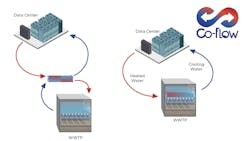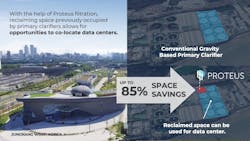Having filed for a patent on their ambitious "Co-Flow Initiative" the company's objective is to develop a data center on land previously occupied by conventional primary clarifiers that has been reclaimed by retrofitting the facility with BKT's small-footprint BBF Proteus biofiltration technology. Integrating data centers into WRRFs provides heat and cooling exchange benefits between the two systems, to dramatically reduce energy and/or water consumption.
Challenges in locating data centers include securing suitable sites that can provide a stable power supply relative to IT capacity demands, environmental regulations, employment, security, and infrastructure. The energy and water savings created by the Co-Flow Initiative will help address multiple crucial infrastructure needs while also minimizing environmental impact and land use.
"As our society moves toward digital transformation, data processing demand becomes crucial in all aspects, requiring more data centers near highly populated urban area,” said Tomorrow Water's CEO, E.F. Kim. “These data centers will typically consume more fossil energy, which would aggravate the already worsening global warming situation. By having the data center in the WWRF, cooling will become easier, saving energy."
SOURCE: Tomorrow Water, via PRNewswire




